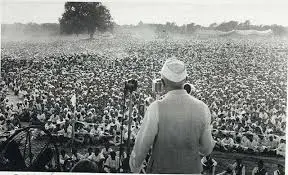As we know, our longest-serving Prime Minister was Jawaharlal Nehru, and he was also the first Prime Minister of India. His tenure was 16 years and 268 days; he served India from August 15, 1947, as well as May 27, 1964, the day he passed away.
As we also know, after India gained independence, he led India for nearly 17 years,
He contributed endless efforts to our country, like democracy, secularism, and a non-aligned foreign policy during the 1950s.

Jawaharlal Nehru’s life was his contribution and struggle were so significant, and he led India very well. His leadership and legacy are deeply good for India. He was India’s first Prime Minister, a well-known member of the Indian National Congress, and an important figure in the fight against British rule. His dedication to democracy, secularism, and a non-aligned foreign policy across his leadership greatly contributed to India’s development into a modern country.
Awakening to Government and Early Life:
Nehru was born in the Pandit family in Allahabad.
Moti Lal Nehru, his father, was a well-known lawyer and national leader.
Nehru completed his education at Harrow and Cambridge, and he studied law in London.
He returned to India and joined the Indian National Congress because of the independence movement.
With the Indian Independence Movement and leadership.
Nehru was close to Mahatma Gandhi and rose to popularity in the Congress party. He was essential in bringing people together and organizing them for the fight for independence. He became famous for his ability to motivate large crowds and deliver powerful speeches.
Legacy:
Nehru’s legacy was complex and very good.
He is fully focused on science and technology because he wants to modernise India.
But he received blame as well for several of his choices and actions, including how he managed some foreign policy issues and how slowly economic reforms went.
Role in India’s Independence
Nehru played a very important role in India’s independence movement. Because Nehru received his education abroad, he modernized India. He knew that foreign culture was very good and disciplined, and he also wanted our country to grow in every field. His main focus to education and a modern India. He was an inspiring person to our youth. He creates a bridge to the masses. The division between the general public and India’s intellectual elite was lessened thanks to Nehru’s socialist teachings and ideals. He gave the Indian independence movement a global platform.
Impact of Nehru on India.
Democracy:
Nehru inspired India’s political and social environment through his support of social justice, secularism, and parliamentary democracy.
Economic Development:
He developed a mixed economy model that focused on both private enterprise and the growth of the public sector in key industries. Through irrigation projects and land redistribution, Nehru also gave agricultural development the greatest importance.
Science and Technology:
Because of Nehru’s strong support for scientific and technical progress, important organizations like the Indian Institutes of The Indian Space Research Organization (ISRO) and the Indian Academies of Technology (IITs) were established.
Death and Public Reaction:

Despite having raised confidence in his constant well-being just days earlier, Nehru died of a heart attack on May 27, 1964. Before being cremated at Raj Ghat, the same site as Mahatma Gandhi’s cremation, Nehru’s body had been preserved for public viewing. Nehru was an important figure in India’s post-independence journey, helping the country explore multiple challenges and making its policies, so his death was not only a personal loss but also a national tragedy. In an amazing statement, cabinet minister Subramaniam said, “The prime minister is no more. Echoing a similar statement used to notify of Mahatma Gandhi’s passing, “The light is out.” Leaders from all over the world recognized Nehru’s important achievements for India and the world, as well as his commitment to peace and accomplishments in international affairs.
